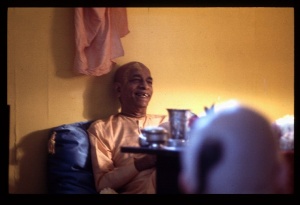SB 8.23.31: Difference between revisions
m (1 revision(s)) |
No edit summary |
||
| Line 1: | Line 1: | ||
{{info | {{info | ||
|speaker= | |speaker=Śukadeva Gosvāmī | ||
|listener=King | |listener=King Parīkṣit | ||
}} | }} | ||
[[Category:Srimad-Bhagavatam - Canto 08 Chapter 23]] | |||
[[Category:Bhagavatam Verses Spoken by Sukadeva Gosvami - Vanisource|082331]] | |||
<div style="float:left">'''[[Srimad-Bhagavatam]] - [[SB 8|Eighth Canto]] - [[SB 8.23: The Demigods Regain the Heavenly Planets|Chapter 23: The Demigods Regain the Heavenly Planets]]'''</div> | |||
<div style="float:right">[[File:Go-previous.png|link=SB 8.23.30]] '''[[SB 8.23.30]] - [[SB 8.24.1]]''' [[File:Go-next.png|link=SB 8.24.1]]</div> | |||
{{RandomImage}} | |||
==== TEXT 31 ==== | ==== TEXT 31 ==== | ||
<div | <div class="verse"> | ||
kriyamāṇe karmaṇīdaṁ | :kriyamāṇe karmaṇīdaṁ | ||
daive pitrye 'tha mānuṣe | :daive pitrye 'tha mānuṣe | ||
yatra yatrānukīrtyeta | :yatra yatrānukīrtyeta | ||
tat teṣāṁ sukṛtaṁ viduḥ | :tat teṣāṁ sukṛtaṁ viduḥ | ||
</div> | </div> | ||
| Line 17: | Line 22: | ||
==== SYNONYMS ==== | ==== SYNONYMS ==== | ||
<div | <div class="synonyms"> | ||
''kriyamāṇe''—upon the performance; ''karmaṇi''—of a ritualistic ceremony; ''idam''—this description of the characteristics of Vāmanadeva; ''daive''—to please the demigods; ''pitrye''—or to please the forefathers, as in a śrāddha ceremony; ''atha''—either; ''mānuṣe''—for the pleasure of human society, as in marriages; ''yatra''—wherever; ''yatra''—whenever; ''anukīrtyeta''—is described; ''tat''—that; ''teṣām''—for them; ''sukṛtam''—auspicious; ''viduḥ''—everyone should understand. | |||
</div> | </div> | ||
| Line 24: | Line 29: | ||
==== TRANSLATION ==== | ==== TRANSLATION ==== | ||
<div | <div class="translation"> | ||
Whenever the activities of Vāmanadeva are described in the course of a ritualistic ceremony, whether the ceremony be performed to please the demigods, to please one's forefathers in Pitṛloka, or to celebrate a social event like a marriage, that ceremony should be understood to be extremely auspicious. | Whenever the activities of Vāmanadeva are described in the course of a ritualistic ceremony, whether the ceremony be performed to please the demigods, to please one's forefathers in Pitṛloka, or to celebrate a social event like a marriage, that ceremony should be understood to be extremely auspicious. | ||
</div> | </div> | ||
| Line 31: | Line 36: | ||
==== PURPORT ==== | ==== PURPORT ==== | ||
<div | <div class="purport"> | ||
There are three kinds of ceremonies—specifically, ceremonies to please the Supreme Personality of Godhead or the demigods, those performed for social celebrations like marriages and birthdays, and those meant to please the forefathers, like the śrāddha ceremony. In all these ceremonies, large amounts of money are spent for various activities, but here it is suggested that if along with this there is recitation of the wonderful activities of Vāmanadeva, certainly the ceremony will be carried out successfully and will be free of all discrepancies. | There are three kinds of ceremonies—specifically, ceremonies to please the Supreme Personality of Godhead or the demigods, those performed for social celebrations like marriages and birthdays, and those meant to please the forefathers, like the ''śrāddha'' ceremony. In all these ceremonies, large amounts of money are spent for various activities, but here it is suggested that if along with this there is recitation of the wonderful activities of Vāmanadeva, certainly the ceremony will be carried out successfully and will be free of all discrepancies. | ||
</div> | |||
''Thus end the Bhaktivedanta purports of the Eighth Canto, Twenty-third Chapter, of the Śrīmad-Bhāgavatam, entitled "The Demigods Regain the Heavenly planets."'' | |||
: | <div style="float:right; clear:both;">[[File:Go-previous.png|link=SB 8.23.30]] '''[[SB 8.23.30]] - [[SB 8.24.1]]''' [[File:Go-next.png|link=SB 8.24.1]]</div> | ||
__NOTOC__ | __NOTOC__ | ||
__NOEDITSECTION__ | |||
Revision as of 09:26, 5 July 2021

A.C. Bhaktivedanta Swami Prabhupada
TEXT 31
- kriyamāṇe karmaṇīdaṁ
- daive pitrye 'tha mānuṣe
- yatra yatrānukīrtyeta
- tat teṣāṁ sukṛtaṁ viduḥ
SYNONYMS
kriyamāṇe—upon the performance; karmaṇi—of a ritualistic ceremony; idam—this description of the characteristics of Vāmanadeva; daive—to please the demigods; pitrye—or to please the forefathers, as in a śrāddha ceremony; atha—either; mānuṣe—for the pleasure of human society, as in marriages; yatra—wherever; yatra—whenever; anukīrtyeta—is described; tat—that; teṣām—for them; sukṛtam—auspicious; viduḥ—everyone should understand.
TRANSLATION
Whenever the activities of Vāmanadeva are described in the course of a ritualistic ceremony, whether the ceremony be performed to please the demigods, to please one's forefathers in Pitṛloka, or to celebrate a social event like a marriage, that ceremony should be understood to be extremely auspicious.
PURPORT
There are three kinds of ceremonies—specifically, ceremonies to please the Supreme Personality of Godhead or the demigods, those performed for social celebrations like marriages and birthdays, and those meant to please the forefathers, like the śrāddha ceremony. In all these ceremonies, large amounts of money are spent for various activities, but here it is suggested that if along with this there is recitation of the wonderful activities of Vāmanadeva, certainly the ceremony will be carried out successfully and will be free of all discrepancies.
Thus end the Bhaktivedanta purports of the Eighth Canto, Twenty-third Chapter, of the Śrīmad-Bhāgavatam, entitled "The Demigods Regain the Heavenly planets."